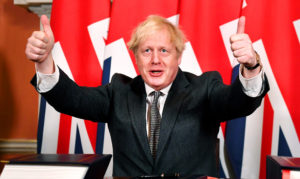One of the brutal facts in British political life is that Prime Ministers are often only remembered for one thing. Neville Chamberlain and appeasement. Winston Churchill and victory in the Second World War. Clement Attlee and the welfare state. Tony Blair and Iraq. Gordon Brown and the global financial crisis. David Cameron and the Brexit referendum. Theresa May and her failure to deal with its consequences. For Boris Johnson, that one thing will be Getting Brexit Done.
By ending Britain’s nearly 50-year membership of the European Union (EU), by returning it from being the so-called “awkward partner” of Europe to becoming an independent sovereign nation-state, the blunt reality is that Boris Johnson will go down in the history books as a Prime Minister who can genuinely claim to have fundamentally changed the direction of Britain. Whether positive or negative, the consequences of his premiership will continue to be felt for decades, if not centuries, to come.
Along the way, he also overhauled his party, its electorate, and political geography. It is true that Britain’s realignment was under way long before Johnson entered No 10. The Conservative Party’s invasion of Labour’s heartlands had not only been visible under Theresa May but can be traced to rising levels of apathy among Britain’s workers and non-graduates, during the late Nineties and the early 2000s, many of whom abandoned New Labour because of its support for mass immigration and EU membership. But it was Johnson who, through the sheer force of his charisma, rallied larger numbers of them into the Conservative Party during the tumultuous months of 2019.
As my own analysis of British Election Study data has shown, feeling positively about Boris Johnson was not just one of the most significant drivers of the Brexit vote but one of the most significant drivers of whether somebody switched from Labour to the Conservatives in 2019. “My voters did not vote for the Conservative Party’” summarised one MP at the same time. “They voted for Boris.” It was, ultimately, Johnson who doubled down on the realignment, handing his party an electorate that was and remains demographically and ideologically different from the one that had rallied around David Cameron only four years earlier. Post-Brexit conservatism became far more blue-collar, non-graduate, older, more white, less urban, and far more culturally conservative than pre-Brexit conservatism ever was.
Yet while Johnson willingly reshaped his party around this electorate, he never really knew what to do with it or where to take it. What his loyalists call The Project never became intellectually coherent or ideologically sophisticated. Cake-ism became the inevitable consequence of a premiership that had no serious intellectual roots or overarching philosophical framework. The glaring absence of serious thinkers among his entourage found its expression in a long list of thin, short-term, and at times openly contradictory policies that never came close to reflecting the wishes of his party’s new voters.
While they wanted less immigration, he gave them more. While they prized aspiration and economic freedom, he gave them the highest tax burden since the Fifties. While they were instinctively suspicious of the state; he put it on steroids. While they expected a serious strategy for Levelling Up, he consistently failed to provide one. While they wanted a strong pushback against the illiberalism of radical “woke” progressivism, he appeared reluctant to get involved. While they thought they had elected a political fighter, he too often worried about how he was perceived by cosmopolitan liberals. While they thought he was on their side, he appeared to treat them with contempt. And while they wanted an economy and a system that did more for ordinary working people, he often appeared more interested in building Singapore-on-Thames. Consistently, Boris Johnson’s Conservative Party has leaned more to the Right on economics and more to the Left on culture than many of its new voters.
This explains why the reformist, if not revolutionary, premiership that many of these voters expected — one that saw Brexit not as the final destination but as a gateway to wide-ranging reforms of the entire system — never materialised. Establishment liberals, Conservative elites, and the donor class were never aligned with the more radical aspirations of the voters Johnson mobilised. Repeated resets in No 10 routinely prioritised changes to personnel over the more ambitious changes to political philosophy which might have better positioned the party in line with its new electorate. Meanwhile, the widening gulf between the Liberal Leaver vision of Brexit and the far more culturally conservative vision that unites many Conservative voters was never addressed or even understood. Even today, this tension continues to sit at the heart of the party, like an unexploded bomb from the Second World War, waiting to detonate unexpectedly in the face of Johnson’s eventual successor.
While many Conservatives will today breathe a sigh of relief that the Johnson regime is finally coming to an end, they will be forced to operate within the context of the realignment that he has mobilised. There is now simply no way forward for the Conservatives, no way they can retain power, that does not involve repairing their relationship with the people who voted for Johnson less than three years ago and who certainly do not want to return to the neoliberal conservatism of the Eighties and the 2010s. Whether any of the potential successors to Johnson can hold and retain this territory remains an open question.
Many of these voters will today be feeling disappointed, despondent, disillusioned, and despairing. And, in the days ahead, it is they who will come to remember Boris Johnson not as a maverick who changed the direction of the country but as the man who was given a once in a lifetime opportunity to fundamentally reshape his party, politics, and the country but who, in the end, squandered it. And for a large chunk of the country, it is that which may yet become the one thing that defines Boris Johnson.
Disclaimer
Some of the posts we share are controversial and we do not necessarily agree with them in the whole extend. Sometimes we agree with the content or part of it but we do not agree with the narration or language. Nevertheless we find them somehow interesting, valuable and/or informative or we share them, because we strongly believe in freedom of speech, free press and journalism. We strongly encourage you to have a critical approach to all the content, do your own research and analysis to build your own opinion.
We would be glad to have your feedback.
Source: UnHerd Read the original article here: https://unherd.com




